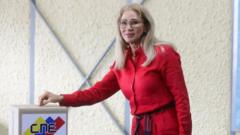The National Electoral Council (CNE), largely perceived as biased in favor of the government, reported that the PSUV won 23 out of the 24 governor positions and approximately 82.68% of the votes for the National Assembly. The opposition, led by María Corina Machado, dismissed the elections as a "farce," pointing to a markedly low voter turnout, suggested to be under 15% by opposition sources, while the CNE claimed it was 42.6%.
Machado, who has been vocal in asserting that a majority of Venezuelans abstained from voting against the Maduro regime, stated, "More than 85% of Venezuelans did not obey this regime." Independent reports from polling stations confirmed a lack of voters, in stark contrast to higher participation seen during the last presidential election.
The opposition's distrust of the CNE stems from its controversial decisions during previous elections, notably the last presidential election where Maduro was declared the winner amid widespread dissent. Many opposition figures, including Edmundo González, who fled to exile following presidential election repression, have raised concerns about the fairness of the electoral process.
In this election cycle, while most significant opposition parties boycotted, a faction chose to step into the political arena, advocating for engagement rather than abstention. Their decision sparked internal conflicts, with leading figures like Henrique Capriles defying the boycott, engaging instead in the elections as a form of resistance. Despite criticism, Capriles won a seat in the National Assembly.
Following the elections, Maduro hailed the results as a mandate for stability and celebrated his party's regained control in key states. However, the electoral process was marred with reported arrests of over 70 opposition figures ahead of the elections, accused of plotting to disrupt the vote. Such actions have prompted accusations of state repression, as voiced by Machado.
Additionally, the elections involved a controversial vote for the Essequibo region, a territory claimed by Venezuela but administered by Guyana. In an act defying an International Court of Justice order, the Maduro government established an election process that had no practical implications for the resident population, consolidating the narrative of the regime's disregard for international law.
In conclusion, while the PSUV claims electoral success, the shadow of boycotts, arrests, and international criticism complicates the legitimacy of their newfound majority, leaving Venezuelans divided on the roadmap toward democracy and stability under Maduro's administration.
Machado, who has been vocal in asserting that a majority of Venezuelans abstained from voting against the Maduro regime, stated, "More than 85% of Venezuelans did not obey this regime." Independent reports from polling stations confirmed a lack of voters, in stark contrast to higher participation seen during the last presidential election.
The opposition's distrust of the CNE stems from its controversial decisions during previous elections, notably the last presidential election where Maduro was declared the winner amid widespread dissent. Many opposition figures, including Edmundo González, who fled to exile following presidential election repression, have raised concerns about the fairness of the electoral process.
In this election cycle, while most significant opposition parties boycotted, a faction chose to step into the political arena, advocating for engagement rather than abstention. Their decision sparked internal conflicts, with leading figures like Henrique Capriles defying the boycott, engaging instead in the elections as a form of resistance. Despite criticism, Capriles won a seat in the National Assembly.
Following the elections, Maduro hailed the results as a mandate for stability and celebrated his party's regained control in key states. However, the electoral process was marred with reported arrests of over 70 opposition figures ahead of the elections, accused of plotting to disrupt the vote. Such actions have prompted accusations of state repression, as voiced by Machado.
Additionally, the elections involved a controversial vote for the Essequibo region, a territory claimed by Venezuela but administered by Guyana. In an act defying an International Court of Justice order, the Maduro government established an election process that had no practical implications for the resident population, consolidating the narrative of the regime's disregard for international law.
In conclusion, while the PSUV claims electoral success, the shadow of boycotts, arrests, and international criticism complicates the legitimacy of their newfound majority, leaving Venezuelans divided on the roadmap toward democracy and stability under Maduro's administration.


















